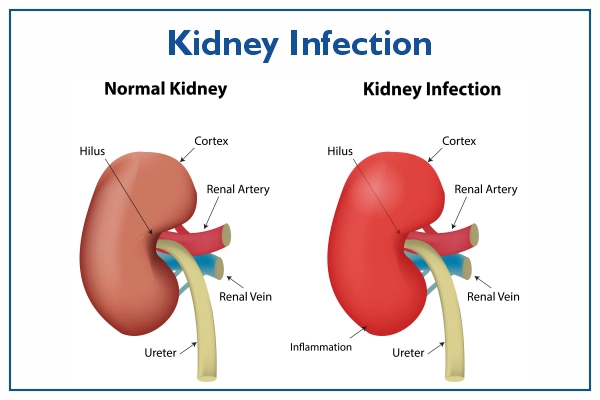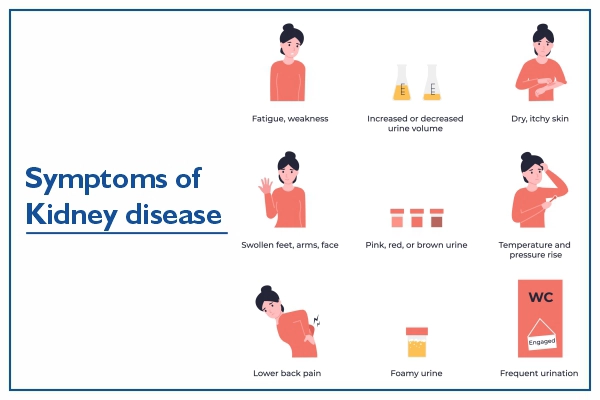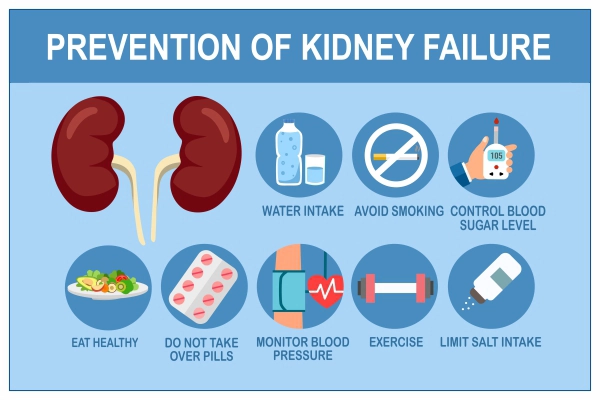Kidney Infection Symptoms, Causes and Treatment Options
Kidney infection occurs when bacteria from the urinary tract move up the urethra and infect one or both kidneys. Kidney infections are more frequent in people who already have a bladder infection, in women, and pregnant women. They are frequently uncomfortable and, if not treated immediately, can cause severe damage to the kidneys. Contact your doctor immediately if you experience symptoms such as discomfort on the sides of your lower back, chills, fever, or pain while urinating (i.e., peeing). If not treated with antibiotics or other medications, it can lead to irreversible kidney failure or spread to different parts of the body.

What is a Kidney Infection?
A kidney infection, also known as pyelonephritis, is a severe medical condition characterized by an infection that affects one or both kidneys. It typically occurs when bacteria, usually from a urinary tract infection (UTI), spread from the bladder to the kidneys.

Kidney Infection Symptoms
Kidney infection may cause the following kidney infection symptoms:
Look for these signs of kidney infection and meet your health provider as soon as possible.
- Fever
- Abdominal pain
- Chills
- Pus or blood in your urine (hematuria)
- Strong, persistent urge to urinate
- Burning sensation during urination
- Foul smell or cloudy urination
- Back, side (flank) or groin pain
- Nausea and vomiting
Kidney Infection Causes or Reasons
The passage of urine typically washes bacteria out. However, a number of factors might raise the risk of a kidney infection. These issues may include:
- Structural abnormalities that obstruct urine flow include strictures, stents, stones, and surgery.
- Compressed urethra by an enlarged prostate gland.
- Urine backflow (reflux) from the bladder to the kidneys.
- Diabetes mellitus is uncontrollable.
- If the immune system is weak due to low white blood cell count, use of certain medications, HIV, cancer, or an organ transplant.
- During pregnancy, the expanding uterus can squeeze the ureters and restrict urine flow, allowing bacteria to move to the kidneys.

Risk factors
A kidney infection can affect anybody. However, the following factors make it more likely:
- Urinary tract infections (UTIs): 1 out of every 30 UTIs leads to a kidney infection.
- Being female: Because the urethra in women is shorter than in males, kidney infection symptoms in women are more susceptible. This makes germs more likely to enter the urinary system. Moreover, in women, the urethra is closer to the vagina and anus, allowing germs to move more quickly to the urinary system.
- Pregnancy: The urinary system changes during pregnancy, making it easier for germs to enter the kidneys.
- Weak immune system: People with diabetes, HIV or AIDS, and those using immune-suppressing medicines all have weakened immune systems.
- Damage to the spinal cord or bladder nerve damage: This might prevent you from detecting the symptoms of a UTI, which could progress to kidney infection.
- The problem is completely emptying your bladder: This is known as urine retention. People with spina bifida or multiple sclerosis are also at risk.
- Urine backup: It is when urine backs up into one or both of your kidneys rather than the typical one-way outflow. It's known as vesicoureteral reflux, and it's most frequent in youngsters.
Complications
There may be severe consequences if the kidney infection goes unchecked or is untreated:
- You may permanently harm your kidneys, resulting in chronic renal disease or, in rare cases, kidney failure.
- Bacteria from your kidneys might poison the bloodstream, resulting in potentially fatal sepsis.
- It is possible to develop renal scarring or excessive blood pressure, although this is uncommon.
- If you are pregnant and have a kidney infection, the baby is more likely to be underweight.
How to Prevent Kidney Infection?
Prevent urinary tract infections to lower your risk of kidney infection. Women, in particular, can reduce their risk of urinary tract infections by doing the following:
- Drink plenty of fluids, especially water. When you urinate, fluids can help eliminate bacteria from your body.
- You should urinate wherever you need to. When you need to pee, don't put off doing so.
- After intercourse, empty the bladder. Urinating as soon after intercourse helps clear bacteria from the urethra, lowering the chance of infection.
- Wipe carefully. Wiping from front to back after peeing and after a bowel movement aids in the prevention of germs spreading to the urethra
- Use of feminine products in the vaginal region should be avoided. It may be unpleasant to use deodorant sprays or douches on the vaginal area.
Kidney Infection Treatment
- The severity of the kidney infection will decide the treatment methods to cure the condition.
- Oral antibiotics are the initial option for treating minor infections. Your doctor will give you antibiotic medications to take at home. Once the results of your urine tests show that you have a bacterial infection, you may be given a different antibiotic.
- Antibiotics are generally required for two or more weeks. Following treatment, the doctor will order more urine cultures to ensure that the infection has gone and has not reappeared. You may need another round of antibiotics if necessary. If you have a more severe infection, your doctor may admit you to the hospital for IV antibiotics and fluids.
- Surgery may be required to repair a blockage or an abnormal shape in your urinary system. This will aid in the prevention of future kidney infections.
